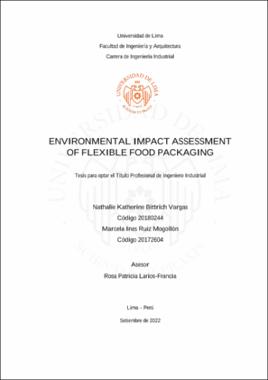Mostrar el registro sencillo del ítem
Environmental Impact Assessment of Flexible Food Packaging
| dc.contributor.advisor | Larios Francia, Rosa Patricia | |
| dc.contributor.author | Bittrich Vargas, Nathalie Katherine | |
| dc.contributor.author | Ruiz Mogollón, Marcela Ines | |
| dc.date.accessioned | 2022-07-25T18:32:48Z | |
| dc.date.available | 2022-07-25T18:32:48Z | |
| dc.date.issued | 2022 | |
| dc.identifier.citation | Bittrich Vargas, N. K. & Ruiz Mogollón, M. I. (2022). Environmental Impact Assessment of Flexible Food Packaging [Tesis para optar el Título Profesional de Ingeniero Industrial, Universidad de Lima]. Repositorio institucional de la Universidad de Lima. https://hdl.handle.net/20.500.12724/16298 | es_PE |
| dc.identifier.uri | https://hdl.handle.net/20.500.12724/16298 | |
| dc.description.abstract | “The impacts of environmental pollution are potentially irreversible and have become a major concern for society. Faced with this reality, the purpose of this research is to identify which type of flexible packaging material used in the food industry creates less pollution. The Leopold Matrix was applied to assess in quantitative terms the life cycle of plastic and paper packaging, using information from various scientific articles and peer-reviewed indexed journals. The interactions between physical, biological, and socioeconomic elements were established for each action in the life cycle of the packages. The results showed evidence that flexible plastic packaging pollutes 16% more in the physical aspect concerning soil and water pollution than paper packaging, which has a more significant impact on air pollution. Regarding the biological aspect, plastic pollutes 63% more than paper when it comes to the damage on the flora and fauna. Finally, moving to the socioeconomic aspect, paper poses a greater health risk for human beings due to the emission of gases in its production, whereas plastic packages contribute more to the economy for being an extensive industry.” | en_EN |
| dc.format | application/pdf | |
| dc.language.iso | eng | |
| dc.publisher | Universidad de Lima | |
| dc.rights | info:eu-repo/semantics/openAccess | * |
| dc.rights.uri | https://creativecommons.org/licenses/by-nc-sa/4.0/ | * |
| dc.source | Repositorio Institucional - Ulima | |
| dc.source | Universidad de Lima | |
| dc.subject | Envases de plástico | es_PE |
| dc.subject | Industria alimentaria | es_PE |
| dc.subject | Contaminación | es_PE |
| dc.title | Environmental Impact Assessment of Flexible Food Packaging | en_EN |
| dc.type | info:eu-repo/semantics/bachelorThesis | |
| thesis.degree.level | Título Profesional | |
| thesis.degree.discipline | Ingeniería Industrial | es_PE |
| thesis.degree.grantor | Universidad de Lima. Facultad de Ingeniería y Arquitectura | |
| dc.publisher.country | PE | |
| dc.type.other | Tesis | |
| thesis.degree.name | Ingeniero Industrial | |
| renati.advisor.orcid | https://orcid.org/0000-0002-1471-9185 | |
| renati.discipline | 722026 | |
| dc.identifier.isni | 121541816 | |
| renati.author.dni | 74528978 | |
| renati.author.dni | 74087287 | |
| renati.level | https://purl.org/pe-repo/renati/level#tituloProfesional | * |
| renati.advisor.dni | 9304466 | |
| renati.juror | Salazar Medina, Nicolás Francisco | |
| renati.juror | Noriega Aranibar, María Teresa | |
| renati.type | https://purl.org/pe-repo/renati/type#tesis | * |
| dc.subject.ocde | https://purl.org/pe-repo/ocde/ford#2.11.04 | |
| ulima.cat | 9 |
Ficheros en el ítem
Este ítem aparece en la(s) siguiente(s) colección(ones)
-
Tesis [1207]



